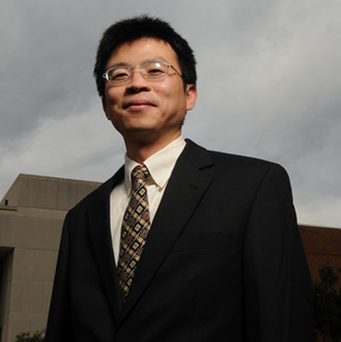We tried to make the media playback on the phone smoother while consuming less power.
Songqing Chen

Songqing Chen is working on improving video streaming on smartphones.
You may soon be able to make dramatic editing changes to photos with just a few clicks on your computer, and you also may be able to get better streaming quality of videos on your smartphone thanks to preliminary research conducted at Mason Engineering and backed by Adobe Research.
Professors in the Department of Computer Science are working with Adobe on cutting-edge projects, and some have already conducted research the company funded. Adobe has donated $120,000 to Mason Engineering.
One of the latest projects: Associate professor of computer science Jyh-Ming Lien’s team collaborated with Adobe researchers to develop a new photo-editing technique that allows people to modify their pictures to reflect different materials. For instance, the process makes it easier to turn a photo of a leather sofa into one covered in a plain or floral fabric.
Currently companies have to take photos of every version of the sofa or use a more time-consuming process to create the different images, he says. “We are using machine-learning algorithms that allow you to take an image and apply a different material to it for a new look.”
This technique could be useful to online stores and graphic artists who want to generate new images with different finishes or materials.
Meanwhile, computer science professor Songqing Chen’s research team investigated ways to improve streaming video on mobile phones. “We tried to make the media playback on the phone smoother while consuming less power,” he says.
Most internet content, including streaming video, is transmitted over HTTP/1.1, but HTTP/2 is gradually replacing HTTP 1.1 to improve user experience, Chen says.
His team looked into ways to utilize the new features offered by HTTP/2 for video streaming to mobile devices. “We have been trying to set up protocols and implement the new prototypes,” he says. “Adobe plays a very active role in the standardization of some of the video streaming techniques.”
Adobe has a list of research questions it shares with Mason Engineering researchers to form collaborations, says computer science professor Robert Simon. The company also offers internships to Mason Engineering students.
During his internship with the company last summer, Haoliang Wang, one of Simon’s PhD students, worked on a project involving storing streaming videos in the Cloud. Wang’s job was to help improve an algorithm the company developed.
Adobe gives Mason Engineering interns “very challenging research assignments,” Simon says.
“Truly for us it has been an excellent industrial-academic partnership not just because of how interesting the students’ jobs are during the summer, but because the Adobe researchers follow up and maintain a relationship with Mason throughout the year.”
Truly for us it has been an excellent industrial-academic partnership not just because of how interesting the students’ jobs are during the summer, but because the Adobe researchers follow up and maintain a relationship with Mason throughout the year.
Robert Simon
